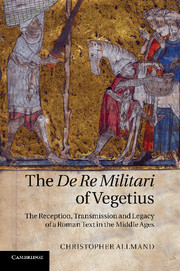 The De Re Militari of Vegetius
The De Re Militari of Vegetius from Part II - The transmission
Published online by Cambridge University Press: 07 October 2011
How were the contents and, in particular, the ideas of the De re militari transmitted down the ages? By suggesting how ideas, founded on a consideration of human experience and given expression by Vegetius, were incorporated into their works by some ten writers among whom there was no shared agenda but who all clearly felt that Vegetian ideas had a certain contemporary resonance, we may see how the De re militari was able to make its presence felt in what they wrote on a number of subjects with a bearing on war. In this process, the text remained a fundamental factor, and the uses made of it will form the backbone of the story. The importance of this work was that it opened people's minds not only to ways which might bring success in war, and who should be responsible for fighting it, but to other matters such as the importance of military organisation and military institutions, including the very notion of the national army itself. Some readers may be surprised by the way in which ideas and theories, developed from and fed upon the content of Vegetius’ work, would encourage developments in fields which did not appear to be, first and foremost, military in character. By means of ten short sections, it is hoped to build up a picture of how this process was developed between the twelfth century and the Renaissance three to four centuries later.
Choices are perforce arbitrary. Yet it is not surprising that a number of the authors to be considered should have been, broadly speaking, French, or at least closely connected to the culture, political as well as military, of France. At least two were Italians, one a Spaniard, another a native of the Low Countries. In time, they range from the twelfth century (1), through the thirteenth (3), the fourteenth (1) and the fifteenth (4) to the early sixteenth century (1). Between them, these authors were responsible for a variety of works, each the product of particular historical circumstances, which would influence both the kind of text in which Vegetian ideas might be reflected and, consequently, the form in which they would be expressed. Thus, at least six of the works to be considered were conceived with a broadly didactic purpose (the De re militari was also of that category), and in the case of the writings of John of Salisbury and Giles of Rome, works concerned with political philosophy. One was a chronicle; others (excluding sets of military ordinances) formed part of a new late fifteenth-century development, the handbook on the art of war based on a mixture of ancient wisdom and the author's personal experiences. Propaganda for the crusade, a legal code and, not least, evidence of how Vegetius’ text was taken up enthusiastically by at least one religious writer together underline both the number and the variety of works which can be shown to have been indebted, in some way, to the De re militari.
To save this book to your Kindle, first ensure no-reply@cambridge.org is added to your Approved Personal Document E-mail List under your Personal Document Settings on the Manage Your Content and Devices page of your Amazon account. Then enter the ‘name’ part of your Kindle email address below. Find out more about saving to your Kindle.
Note you can select to save to either the @free.kindle.com or @kindle.com variations. ‘@free.kindle.com’ emails are free but can only be saved to your device when it is connected to wi-fi. ‘@kindle.com’ emails can be delivered even when you are not connected to wi-fi, but note that service fees apply.
Find out more about the Kindle Personal Document Service.
To save content items to your account, please confirm that you agree to abide by our usage policies. If this is the first time you use this feature, you will be asked to authorise Cambridge Core to connect with your account. Find out more about saving content to Dropbox.
To save content items to your account, please confirm that you agree to abide by our usage policies. If this is the first time you use this feature, you will be asked to authorise Cambridge Core to connect with your account. Find out more about saving content to Google Drive.